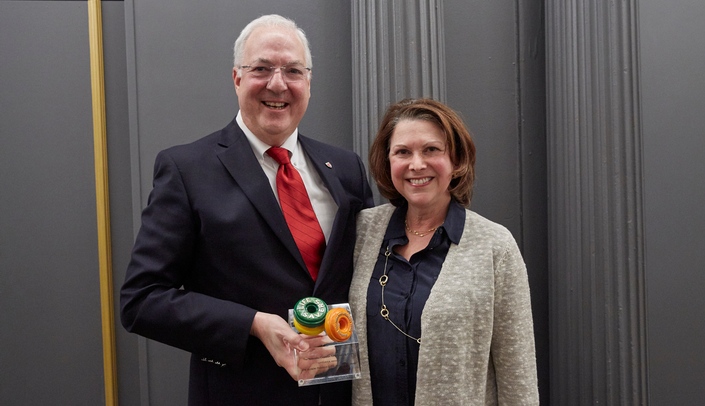One of the University of Nebraska Medical Center’s most dynamic couples – Ken Cowan, M.D., Ph.D., and Alison Freifeld, M.D. – received the annual Lifesavers Award recently at the 16th Annual Spring Tribute Luncheon for the Nebraska Coalition for Lifesaving Cures at Happy Hollow Club.
The award is given each year by the coalition to recognize individuals who have made a difference in the world through their passionate support of medical research.
The couple have been community leaders since they moved to Omaha in 1999. Dr. Cowan is director of the Fred & Pamela Buffett Cancer Center and the Eppley Institute, while Dr. Freifeld is professor of internal medicine and director of the section of oncology infectious diseases.
With the Buffett Cancer Center celebrating its first year of operation, Dr. Cowan has played a prominent role in taking the medical center’s cancer program to the next level.
He hopes the $323 million Buffett Cancer Center – the largest public-private partnership in the history of the University of Nebraska – will provide the impetus to allow the medical center to become a comprehensive cancer center, the highest level designated by the National Cancer Institute. Only 49 cancer centers around the country currently hold the comprehensive cancer center designation.
“Ken has a unique quality – he’s a very empathetic physician,” said UNMC Chancellor Emeritus Harold M. Maurer, M.D., who recruited Dr. Cowan from the National Cancer Institute. “He gives his personal cell phone and email address to patients.
“When I was chancellor and asked him about a patient, he would always say, ‘I’ll take care of it.’ That’s the kind of physician he is.”
Research is a huge focus in the Buffett Cancer Center as the Suzanne and Walter Scott Cancer Research Tower is 10-stories high and includes 98 research labs. Unique in its design, the Buffett Cancer Center is the most fully integrated cancer center in the world, as it puts clinical providers in close proximity with their research colleagues with the goal of more efficiently translating research to patient care
Dr. Freifeld has implemented and led several programs focused on managing infections in cancer and organ transplant patients. She created the UNMC Travel Health Clinic, which protects students and faculty traveling for research or study abroad by ensuring they are up-to-date on immunizations.
She also has a leadership role in global health initiatives at UNMC which are aimed at creating medical research and health education collaborations between UNMC and international partners. Most recently, she has been working with the Rwandan government to develop opportunities for bi-directional exchange experiences for students and residents.
Over the past 25 years, Dr. Freifeld’s research has focused on antibiotic management of cancer patients who frequently develop serious infections as a consequence of chemotherapy-induced “neutropenia” – a condition in which there is a severe reduction of infection-fighting white blood cells in the patient’s body.
Mark Rupp, M.D., professor of internal medicine and chief of the division of infectious diseases, called Dr. Freifeld “a globally-recognized authority on how to best treat patients with infectious complications due to immunosuppressive cancer therapy.”
“The award reflects a career of work that Dr. Freifeld has had at UNMC dedicated toward caring for immune-compromised cancer patients,” Dr. Rupp said. “In addition, demonstrating her many talents, Dr. Freifeld has led projects directed toward development of rapid diagnostic tests to be used in underdeveloped countries as well as experimental antifungal medicines, antiviral drugs, and new vaccines. We couldn’t be more proud of her accomplishments. Bravo!”
Sidebars:
Importance of research
“If you think research is expensive, try disease.”
That was the message of Alison Freifeld, M.D., as she made her acceptance speech at the Annual Spring Tribute Luncheon for the Nebraska Coalition for Lifesaving Cures.
Dr. Freifeld cited a 2014 study, which found that basic research supported by the National Institutes of Health costs each U.S. citizen 25 cents per day.
In contrast, people spend 56 cents per day on snack food and 98 cents on alcoholic beverages in stores.
Thanks to medical research, Dr. Freifeld said things are getting better on the health front. She noted that:
–Life expectancy in the U.S. has risen from age 71 to 79 between 1970 and 2013.
–Heart disease deaths have decreased by about 70 percent.
–Mortality rates for diabetes and stroke have dropped significantly.
–Cancer deaths have declined nearly 15 percent from 2003 to 2012.
–Cancer deaths in children have declined dramatically since the 1970s.
A huge research breakthrough in cancer care occurred in 2003, Dr. Cowan said, when the approximate 20,500 genes in the body were sequenced through the Human Genome Project.
“We now know that no two cancers have the same genomic signature,” he said. “We can now provide extraordinary care to patients by individualizing the treatment plan and greatly improving their quality of life.”
Previous honorees of the Lifesavers Award
2018 – Ken Cowan, M.D., Ph.D., and Alison Freifeld, M.D.
2017 – Mary Ann “Andy” Holland
2016 – Jim and Diny Landen
2015 – Wally and Barbara Weitz
2014 – Harold M. Maurer, M.D., and Beverly Maurer
2013 – John and Lynne Boyer
2012 – Fred and Eve Simon
2011 – Linda and Charles Wilson, M.D., and Walter and Suzanne Scott
2010 – Michael Yanney and Gail Walling Yanney, M.D.
2009 – Dorothy and Stanley Truhlsen, M.D.
2008 – Richard Holland
2007 – James Armitage, M.D.
2006 – Harold and Marian Andersen
2005 – Rik Bonness and Shannon Bonness, M.D.
2004 – Michael Sorrell, M.D.
2003 – Charles Durham
We are Nebraska Medicine and UNMC. Our mission is to lead the world in transforming lives to create a healthy future for all individuals and communities through premier educational programs, innovative research and extraordinary patient care.
Twitter | Facebook | Instagram | YouTube | Flickr
